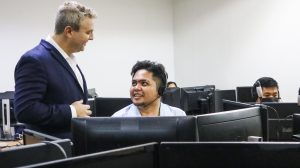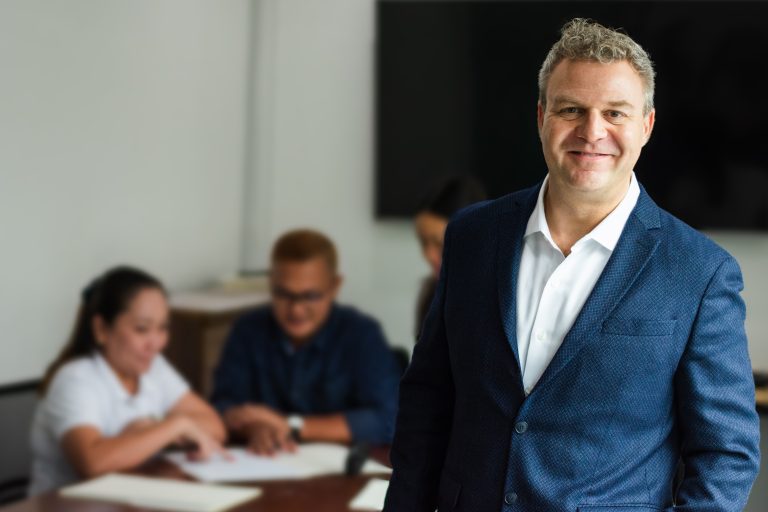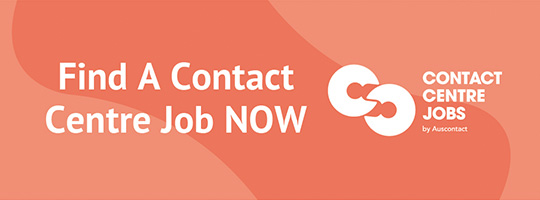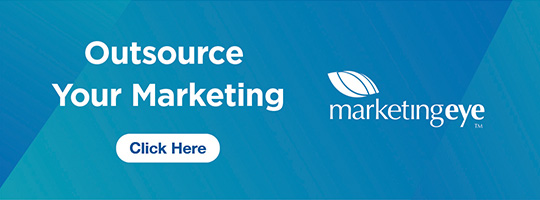As consumers become more aware of the impact of their choices on the world, the importance of fair trade and ethical sourcing has gained significant traction changing mindsets and behaviours. For businesses, ensuring a sustainable future means going beyond profits and considering the impact of their operations on local communities and the environment. Fair Trade Outsourcing, led by visionary entrepreneur Mike Dershowitz, is one such company that is making a difference.
By providing ethical outsourcing solutions that empower local workers and combat poverty in developing countries, Fair Trade Outsourcing is a shining example of how businesses can be a force for good.
In this Q&A, we sit down with Mike Dershowitz to learn more about his journey, his vision and the impact of Fair Trade Outsourcing on local communities.
“In order to fight poverty, we must use the power of the free market for good and promote moral leadership in the BPO industry.”
Mike Dershowitz, The founder and CEO of Fair Trade Outsourcing
Q & A
When you started Fair Trade Outsourcing, what was your vision for the company?
I’ve been public about the fact that starting FTO was about how good of a business BPO can be for its employees and owners if done right. But I meant financially, having not realised at the time how good socially the BPO business can be.
Ultimately, I got into the BPO business because of the fundamentals of international trade. Companies that struggle to find sufficient labour, or labour at a cost that works for their business, can make their work portable and send it to people who can do the work at the right quality and cost and scale.
Initially, it was the inherent strength of this cross-border international trade – between client, company, and agent that I found impressive and made me want to be in this business.
What is the purpose of FTO?
FTO is a dual-purpose company – we simultaneously pursue both financial and social profit. We are like every other company, except that we are required to produce social profit, which we do in the form of lifting households out of poverty.
How did your clients respond to the mission of FTO?
Our performance is industry leading in a way that can make the numbers, upon first glance, look too good to be true. This is where the purpose really comes into play because it explains, beyond doubt, how we are achieving industry leading results.
So in this way, they respond quite well – it explains why we’re able to do what we do, and also makes them feel good about outsourcing ethically and morally.
That being said, and understandably so, clients really just want quality, performance, and good pricing structures. So generally, once they feel they understand the how of what we do, to them we’re really just like any other BPO, and it’s about the operations.

How do employees respond to the philosophies behind FTO?
There are two responses to this: anecdotal and by the numbers.
Anecdotally, and in surveys, employees respond quite well to FTO. Many come and stay for a quality, sustainable job where they are guaranteed a fair and safe workplace (guaranteed by our “ABOR” – Agent Bill of Rights).
What we do to help their households exit poverty is really icing on the cake. This can be sometimes not well understood by them (and it’s something we’re putting a lot of resources into right now to change).
This is where the numbers start to get really interesting. Over the last 6 years we’ve averaged 1.2 percent monthly voluntary attrition (total attrition is < 4%). For an operation of more than 1,600 people, it’s
not significant in an industry where the largest companies employ hundreds of thousands of people, but it’s big enough where you have to start asking if this is better way to run a BPO company. Time will tell as we keep growing.
Besides the attrition numbers, employees tell us that they like working here because they refer their friends. 70 percent of all new employees come from existing employees. We have a company-wide Employee Net Promotor Score (eNPS) of +68, which reflects how likely our employees are to recommend our company as a workplace. All our employees across our four country locations participate in the eNPS measurement and our score is close to the highest in the industry.
How do you measure performance of your employees?
We have two sets of measurements. First is what we call “client measurements”.- That’s whatever production and quality metrics are needed by our clients (since we do mostly custom teams). It’s the things you’re used to seeing; error rate, AHT, FCR, work units per hour etc.
However, because we’re dual-purpose, we have a second set of measurements, and that’s our economic mobility measurements. We measure things like change in agent household income, agent indebtedness and agent mobility-(how many have been promoted or moved into a higher paying positions). This gives us a really good picture as to what stressors the agent may be carrying in the door when they come to work.
How we deal with what we read in the data is the business strategy. For example, we make zero interest payroll loans available to our employees. We’d rather have them indebted to us than an informal lender who may take advantage of them. Second, we will give grants to help alleviate stress for some negative economic events like natural disasters, sickness, or a death in the family. Finally, and possibly most importantly, we guarantee them that if we lose business from one client, we’ll transfer them to another, with layoffs as a last resort. This promise of job security is critical to helping them plan for life and know that if they perform, a paycheck will always be there.
What tech stack do you use in your contact centre?
As a middle-market provider, we have to be flexible so we’ve never standardised on the use of one platform. We leverage MSFT 365 products along with SAP ERP and support everything from Genesys and NICE through to Zen Desk and other platforms on behalf of our customers. FTO also has several customers where we work inside their proprietary products.
What are some of the outcomes from the way that FTO operates in local communities?
Firstly, as I mentioned earlier, a steady job has a lot of power for the people that work with us especially in lower-income communities. When someone has a steady job in the formal economy, they become the anchor for that household, and can be an economic anchor to their extended families. That person’s relative wealth spreads out beyond their doorstep, with poverty reduction extending past just the Agents’ households.
Secondly, we are active in working with universities with all types of practical training programs made available for students. Everywhere we have a centre, we set up this core function of supporting students with practical skills. Over the years we’ve learned that a call centre job can be the start of a business career, so we work hard to form partnerships with corporates and educational institutions where we can create opportunities for young people.
One of the principles of the “Fair Trade Movement” is that by building up a person’s “capacity” and not just training them for “this or that” unit of work, we are exploring their potential. For example, we invested early in a Chief Learning Officer so that we can provide better training and development for our teams. Next year, we will be opening training programs up to the communities in which we operate, providing free learning – not just for our agents.
What’s your background and how did you get to this point where you are growing a business with purpose?
I’m not sure how or why it happened, but I grew up wanting to change the world. As a child, I was always surrounded by small business owners like my father, my uncle, my grandfathers and cousins. That is what I knew and was the impetus for wanting to change the world and be in business.
I think the two biggest threats future humanity faces are climate change and social unrest due to economic disparity. In my previous business which was in the solar industry, it was important to build software that helped broaden solar adoption. That business was really my bridge into purpose-driven companies. By making the solar design, quoting and contracting process easier through technology, more solar was able to be installed, and less electricity would be generated by fossil fuels. It made sense.
For FTO, it’s been incredible to watch how the social purpose in a people-orientated company can galvanise not just employees, but the whole organisation. It made us stronger from the bottom up and vice versa. From that perspective, running FTO has really completed my journey from aspiring do-gooder to having a real solution for making money while solving real human problems.
How do you think other companies could contribute to eradicating poverty?
Simply by putting social change on the agenda, companies can make a difference. With us, when we give an Agent a contract that supports steady employment, it can solve household problems and help them find a way out of poverty. Fair wages is critical to helping change the narrative.
Agents are proven to work harder for companies that pay them fairly and give them working conditions that are healthy and considerate. By companies supporting initiatives like this, their business will become more resilient, and better able to compete in the market. If you treat your employees well, they will treat your customers well, and the rest takes care of itself.
What’s next for FTO?
FTO has had burgeoning growth over the past few years. This is set to continue with headcount growth, infrastructure build-out and the opening of new offices. We recently opened our first operation in the US and plan to expand to Africa in 2023, with India also on the agenda.
We have invested heavily in understanding the impact of our operations on the families and communities in which we operate. Using this data, the true impact is realised and can be leveraged to do more for Agent’s lives.
Having worked extensively with small and mid-market businesses, the shift to enterprise is imminent. Corporations are realising the full potential of working with companies that have “fairer” practices and capitalising on the flow on effect to customer experience, and their own employee attrition rates.










Comments are closed.